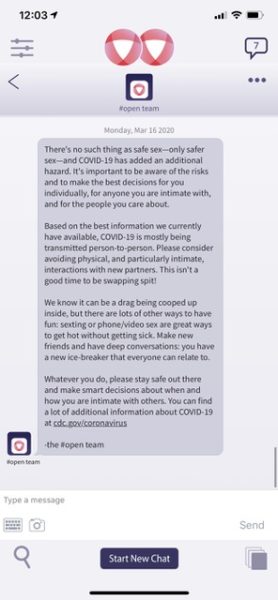A dating app is telling its users that “now is not the time” for meeting up in person and encouraging them to use their platform to explore virtual relationships instead.
A relative newcomer among the array of dating apps, #open was launched by co-founders Amanda Wilson and David Epstein, who themselves met on a dating app in 2015 and decided to build one of their own a year later. By 2018, their brainchild was in the Apple app store, and Android began offering it in April of 2019. Since then, it has grown to serve over 48,000 users – with an impressive 43,000 matches made.
What makes this app different from Grindr or Tinder, or any of the other better-known players in the game?
According to Epstein, “As our name implies, it’s an app that’s been built for people with a fairly open mindset, when it comes to human sexuality.”
A look at the wide array of identities and orientations among their users (besides offering 24 different gender identities and 23 sexual orientations to choose from, the app also lets you enter your own), as well as the high percentage of people identifying as being in non-traditional relationships, gives a clear picture of why #open has a unique appeal.
Epstein elaborates, “The one thing the users have in our community have in common, more than anything else, is that 95% of our users identify as being in some kind of an open relationship – whether that’s the 28% that are polyamorous or the 5% that consider themselves ‘monogom-ish’ or anything in between.’ That’s the common thread.”
Perhaps the fledgling app’s targeted focus accounts for the growth in its numbers, but with the last two months seeing a particular rise in both new user profiles and user interactions, it’s likely also a reflection of coronavirus fears beginning to drive people online in greater numbers. Whatever the reason behind it, the company’s co-founders want to live up to their core value as an “honest dating app” and make sure its swelling membership is practicing “social distancing” by getting to know potential partners remotely instead.
As Wilson puts it, “People right now are trying to figure out how they’re going to maintain their connection and their community, and their social lives, and apps are meeting one of those needs, obviously. We’ve been saying for a while that dating has been changing, and now this is going to bring more change, for a little bit.”
With that in mind, she says, the company made the decision to send out a message to all of its users on Monday, “urging them to remember that there is no safe sex, there is only safer sex, and that now is not the time to be swapping spit with people, and to stay home.”
Epstein elaborates further, “We’re a sex positive app, and the people in our community understand the incredible importance of transparency – especially when you’re talking about people in polyamorous relationships, or practicing ethical non-monogomy. And of course, we have huge at-risk populations here. We just don’t think you can play it too safe right now.”
Rather than using the app to arrange intimate in-person encounters, the company suggests taking an opportunity to work on aspects of dating that are often ignored in our age of instant gratification.
“We really think it’s a time to explore communicating,” says Epstein, “through the app, or through Facetime or any of the other tools people have available to them on their smart phones.”
“Relationships are all about communication,” Wilson interjects. “So, you know, swipe right more often, talk to people that you wouldn’t necessarily usually talk to.”
“And you know it doesn’t have to be boring,”she adds. “There are things that you can do to spice up your lives when you’re stuck inside.”
“If you are exploring your sexuality,” Epstein elaborates, “we think this is a time to explore it in a virtual way.”
Anyone with a smart phone and a libido is sure to understand exactly the kind of thing they are hinting at, and though it may not be as good as “IRL” for a lot of us, it’s definitely something to explore as a means of getting through what could be a long haul of ethical self-isolation.
“We need to lean into the long game,” Wilson stresses. “In this day and age when you can get anything at any time, within a couple of hours, we’re used to immediacy – but now we can get to know people again, and play around with delayed gratification.”
Epstein interjects, “There will be a lot of delayed gratification built up on the other side of this, and that’s not necessarily a bad thing.”
Wilson, with a similarly positive attitude, sums the situation up.
“We’re going to be in our own homes for a while now – and that’s okay. Dating will rebound.”
Story courtesy of the Washington Blade.


